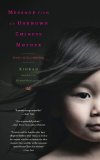Summary | Excerpt | Reviews | Beyond the Book | Readalikes | Genres & Themes | Author Bio

Stories of Loss and Love
by Xue Xinran
In his comparative study New Theory of Population (1957), Professor Ma wrote that in the years 1953–57 the population may actually have exceeded the 20 percent annual increase found in the 1953 survey. In his view, the slow growth of manufacturing technology together with a surge in population and its attendant social conflicts meant that as the global economy and civilization developed, China would lag behind. Ma's ideas were diametrically opposed to Mao's, which were that the population and the economy should grow in parallel. As a result, Ma was persecuted during the Cultural Revolution. But history proved Ma right: the population continued to grow - from 700 million in 1966 to 1.2 billion in 1979 - while education and the economy lagged far behind that of the developed world.
Even today, most city dwellers over the age of forty-five will remember the treasured ration coupons for oil, meat, grain, and cloth. One year, I remember queuing from five o'clock in the morning until noon in the snow and freezing temperatures to buy half a pound of pork for my teacher. This was the ration for the entire family for their Chinese New Year dinner! In the countryside, the population continued to grow. The increasing narrowness of roads between the fields was mute proof of the struggles to wrest food from every tiny scrap of land. To put it bluntly, the economy was stagnating and the imposition of a population control policy offered a tiny respite in the daily struggle for survival for a people who had suffered a century of war and political upheavals and battled daily with poverty. Millions of families, however, continued to believe that it was their god-given duty to produce a male heir to carry on the family line; in fact, it was a sin not to do so.
As the "family planning era" really got under way in the 1980s, these people paid a heavy price. Whole families were ruined, homes destroyed, and people died at the hands of village cadres who carried out family planning policies crudely and violently. It was illiterate peasant families who fought the local government most bitterly for the chance to have a baby boy. There is a Chinese saying I've quoted before that "the heavens are high and the emperor far away," meaning that the farther one goes from the center of government, the more likely it is that local rules will prevail over edicts from the capital. With an area of 9,600,000 km,2 China is a vast country and there are areas where the one-child policy has never been effectively implemented. In the most remote mountain areas in the west of China only lip service is paid to it. In 2006, when I was doing interviews for my book China Witness in the region bounded by the Yellow River and the Yangtze River, I came across many families with five or more children in mountain villages in the west; even in the east of China, poor peasant families with three or more children were common. On my visit back to China in December 2009 I had four different taxi drivers in four different cities - Tianjing, Nanjing, Anhui, and Guangzhou - who all came from the countryside and each of them told me the same thing: that they have more than three children. They said that the one-child policy can be avoided by money and power in their hometown!
Not all twenty somethings in China are only children; there are also many with hordes of brothers and sisters. In contrast, in eastern China's urban areas, enforcement was and is draconian. Almost everyone lived within the state-planned economy up until the beginning of the 1990s. So having more than one child meant losing your job, your home (which was allocated by your employer), your entitlement to food and clothing rations, your child's entitlement to schooling and medical care, and even your chance of finding other work, as no one would dare employ you. Just because you had had one "extra" child, you and your family would forfeit absolutely everything. Among educated people, there were very few indeed who were prepared to run the risk of ruining their prospects in this way. However, that did not stop them from employing every possible means, from modern medical technology to traditional Chinese herbal remedies, to ensure the birth of a boy. I think this goes some way to explaining the gender imbalance in some areas of China.
Excerpted from Message from an Unknown Chinese Mother by Xue Xinran. Copyright © 2011 by Xue Xinran. Excerpted by permission of Scribner. All rights reserved. No part of this excerpt may be reproduced or reprinted without permission in writing from the publisher.
Every good journalist has a novel in him - which is an excellent place for it.
Click Here to find out who said this, as well as discovering other famous literary quotes!
Your guide toexceptional books
BookBrowse seeks out and recommends the best in contemporary fiction and nonfiction—books that not only engage and entertain but also deepen our understanding of ourselves and the world around us.